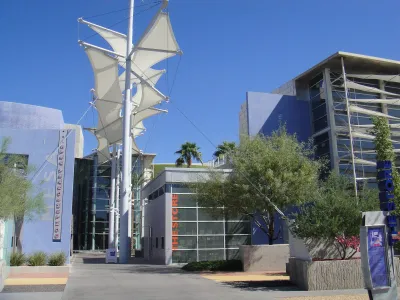Convention and arts centers are costly and lose lots of money, but cities still build and advocate for them.

Jen Fifield reports that cities across Arizona own event spaces that are expensive to build and manage and end up losing money. Mesa, Glendale, Phoenix, Tempe, and Scottsdale have public facilities whose bottom lines that have resulted in huge annual losses — from hundreds of thousands of dollars into the millions.
Cities make up the deficits through taxes and other funding. Some have turned over management to private companies or nonprofit organizations.
Arizona cities are willing to take a hit on these spaces because of what are seen as the larger benefits, says Fifield:
City officials across the Valley say looking simply at direct revenue the spaces bring in doesn't show the whole picture. The venues attract people to the city, who then spend money on food, travel and hotels. That outside revenue, city officials say, brings in more than enough to make up for the cost.
This phenomenon is not particular to Arizona. Cities across the country have ramped up construction of convention space, even when the cost is substantial and the demand is not apparent.
“[Heywood] Sanders has argued in academic papers and a book he wrote called ‘Convention Center Follies’ that although government officials always claim ancillary benefits from building, expanding and operating the spaces, they are expensive and rarely fulfill their promises,” says Fifield.
FULL STORY: Phoenix-area cities want to offer space for events, but they're all losing money doing it

Analysis: Cybertruck Fatality Rate Far Exceeds That of Ford Pinto
The Tesla Cybertruck was recalled seven times last year.

National Parks Layoffs Will Cause Communities to Lose Billions
Thousands of essential park workers were laid off this week, just before the busy spring break season.

Retro-silient?: America’s First “Eco-burb,” The Woodlands Turns 50
A master-planned community north of Houston offers lessons on green infrastructure and resilient design, but falls short of its founder’s lofty affordability and walkability goals.

Test News Post 1
This is a summary

Analysis: Cybertruck Fatality Rate Far Exceeds That of Ford Pinto
The Tesla Cybertruck was recalled seven times last year.

Test News Headline 46
Test for the image on the front page.
Urban Design for Planners 1: Software Tools
This six-course series explores essential urban design concepts using open source software and equips planners with the tools they need to participate fully in the urban design process.
Planning for Universal Design
Learn the tools for implementing Universal Design in planning regulations.
EMC Planning Group, Inc.
Planetizen
Planetizen
Mpact (formerly Rail~Volution)
Great Falls Development Authority, Inc.
HUDs Office of Policy Development and Research
NYU Wagner Graduate School of Public Service



























